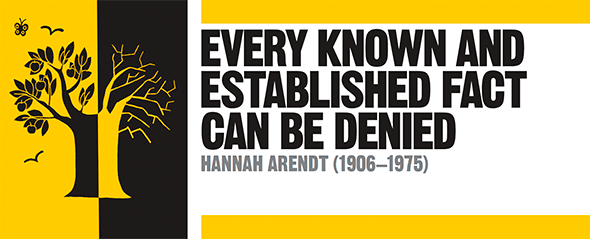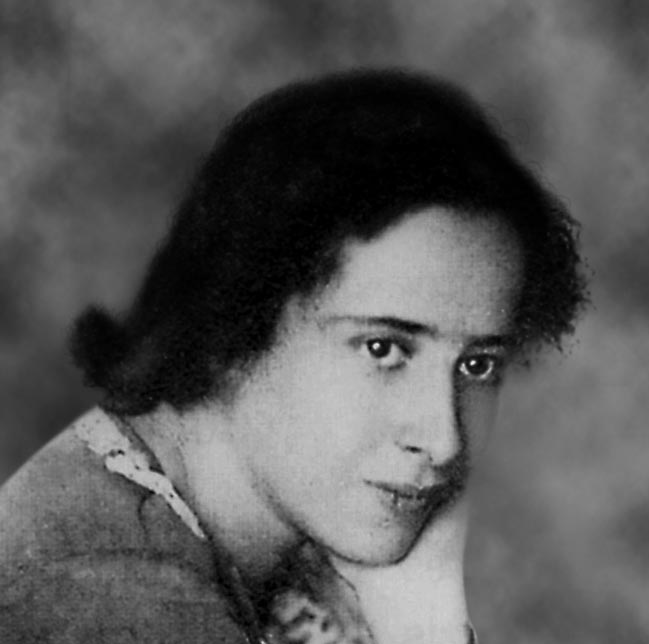
IN CONTEXT
Anti-totalitarianism
Truth and myth
1882 French historian Ernest Renan claims that national identity depends upon a selective and distorted memory of past events.
1960 Hans-Georg Gadamer publishes Truth and Method focusing on the importance of collective truth creation.
1992 British historian Eric Hobsbawn states that “no serious historian can be a committed political nationalist.”
1995 British philosopher David Miller argues that myths serve a valuable social integrative function, despite being untrue.
1998 Jürgen Habermas criticizes Arendt’s stance in Truth and Justification.
The German political philosopher Hannah Arendt wrote about the nature of politics at a particularly tumultuous time: she lived through the rise and fall of the Nazi regime, the Vietnam War, student riots in Paris, and the assassinations of US president John F. Kennedy and Martin Luther King. As a Jew living in Germany, who later moved to occupied France, and then Chicago, New York, and Berkeley, Arendt experienced these events firsthand. Her political philosophy was informed by these events and their portrayal to the general public.
In her 1967 essay Truth and Politics, Arendt is particularly concerned with the way that historical facts often become distorted when politicized—they are used as tools in order to justify particular political decisions. This distortion of historical facts was not new in the political domain, where lies have always played an important part in foreign diplomacy and security. However, what was new about the political lies of the 1960s onward was their significantly wider scope. Arendt notices that they went far beyond simply keeping state secrets to encompassing an entire collective reality in which facts known to everyone are targeted and slowly erased, while a different version of historical “reality” is constructed to replace them.
This mass manipulation of facts and opinions, Arendt notes, is no longer restricted to totalitarian regimes, where oppression is pervasive and evident, and people may be on guard against continual propaganda, but increasingly takes place in liberal democracies such as the US, where doctored reports and purposeful misinformation serve to justify violent political interventions such as the Vietnam War of 1954–75. In free countries, she claims, unwelcome historical truths are often transmuted into mere opinion, losing their factual status. For example, it is as though the policies of France and the Vatican during World War II “were not a matter of historical record but a matter of opinion.”

An alternative reality
The rewriting of contemporary history under the very eyes of those who witnessed it, through the denial or neglect of every known and established fact, leads not only to the creation of a more flattering reality to fit specific political needs, but also to the establishment of an entirely substitute reality that no longer has anything to do with factual truth. This, Arendt argues, is particularly dangerous—the substitute reality that justified mass killings under the Nazi regime is a good example. What is at stake, Arendt says, is “common and factual reality itself.”
Contemporary followers of Arendt point to the 2003 invasion of Iraq by the US and its allies as an example of this phenomenon. Arendt’s arguments might also be used by Julian Assange, founder of WikiLeaks, to justify the release of secret documents that contradict the official version of events given by governments around the world.

During the war in Vietnam, the US government supplied misinformation to the public—distorting the facts in the way that Arendt describes—in order to justify their involvement.
HANNAH ARENDT

Hannah Arendt was born in Linden, Germany, in 1906, to a family of secular Jews. She grew up in Königsberg and Berlin and studied philosophy at the University of Marburg with philosopher Martin Heidegger, with whom she developed a strong intellectual and romantic relationship, later soured by Heidegger’s support for the Nazi party.
Arendt was prohibited from taking up a teaching position at a German university due to her Jewish heritage, and during the Nazi regime, she fled to Paris and later the US, where she became part of a lively intellectual circle. She published many highly influential books and essays, and taught at the University of California, Berkeley, the University of Chicago, the New School, Princeton (where she became the first female lecturer), and Yale. She died in 1975 of a heart attack.
Key works
1951 The Origins of Totalitarianism
1958 The Human Condition
1962 On Revolution
See also: Ibn Khaldun • Karl Marx • José Ortega y Gasset • Michel Foucault • Noam Chomsky
